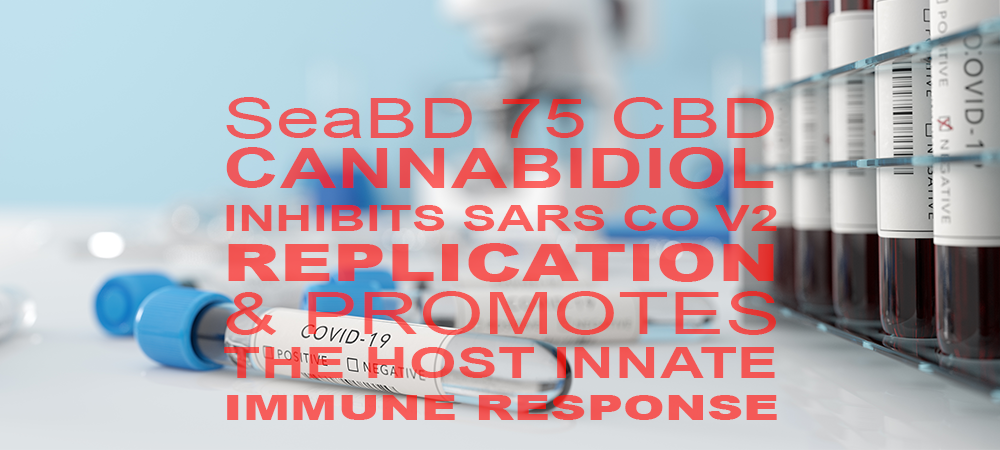Cannabidiol Inhibits SARS-Co-V-2 Replication and Promotes the Host Innate Immune Response.
To say it another way, there’s a certain metabolite of CBD that restrains SARS-Co-V-2 from making more of itself once it enters the body, and that certain metabolite of CBD increases the activity of the body’s first responder (innate immune system).
As a first responder, your body’s (host) innate immune system detects viruses, bacteria, parasites, and toxins with the intention of preventing infection and attacking the foreign invading pathogen (SARS-Co-V-2).
A virus is a piece of information that contains instructions (genetic code), like a computer code that’s packaged inside a protective protein shell (nucleocapsid) and surrounded (enveloped) with a lipid bilayer of protruding spikes ((great graphics at this link ->> (S) protein trimer)).
Technically, a virus is not alive, it’s dependent on a host’s living cells to carry out its instructions; and it’s primary set of instructions is to make more of itself (replication).
Once a virus enters the body (eyes, nose or mouth) and attaches to a cell, all it has to do is break into the cell by picking its lock (protein receptor). After that the SARS Co-V 2 virus downloads (mRNA initiated translation) its instructions that tells the cell to use its machinery and resources to make more SARS Co-V-2 virus, and so on….
A number of small molecules that target the body’s Stress Response Pathways and have antiviral potential were tested in an effort to suppress infection by the SARS Co-V-2 beta coronavirus. CBD (Cannabidiol) checks both boxes. It regulates the host Stress and Antiviral Inflammatory Responses.
CBD is rapidly metabolized in the liver and gut into two main metabolites, 7-carboxy-cannabidiol (7-COOH-CBD) and 7-hydroxy-cannabidiol (7-OH-CBD). We’re interested in the latter because A549 human lung carcinoma cells were pretreated with CBD 2 hours prior to infecting the cells with SARS-Co-V-2.
The study concluded that the CBD metabolite 7-hydroxy-cannabidiol (7-OH-CBD) effectively inhibited SARS-Co-V-2 replication in A549-ACE2 cells, and was non-toxic to cells.
However, this was an artificial test environment outside of a living organism (in vitro), and the concentrations of CBD and 7-OH-CBD were/are measured to document outcomes for potential interventions. The question is how does human blood plasma concentrations of CBD and 7-OH-CBD compare to these test results?
An analysis of blood plasma levels in healthy patients taking CBD shows a C max (maximal concentration) for CBD in the nM (nanometer) range, whereas 7-OH-CBD had a C max (maximal concentration) in the uM (micrometer) range. Just for reference, a nM (nanometer) is 1/1000 the size of a uM (micrometer).
Although the CBD levels are not at the levels needed to effectively inhibit SARS-Co-V-2 in people, the 7-OH-CBD levels were similar. And that’s good news because it’s the 7-OH-CBD metabolite ‘In’ CBD that inhibited SARS-Co-V-2 replication in test study. Also, the blood “plasma concentrations of the CBD metabolite 7-OH-CBD can be increased several fold by taking CBD with a high-fat meal, and these levels are sufficient to potentially inhibit SARS-Co-V-2 infection in humans.”
Other tests were performed on the (A549-ACE2) human lung carcinoma cells infected with SARS-Co-V-2 to see if CBD had any affect on mRNA’s ability to download its instructions (transcriptome) into the infected cells. The RNA-sequencing analysis of infected A549-ACE2 cells that were treated with CBD for 24 hours shows a “striking suppression of SARS-Co-V-2”, the CBD induced changes in gene expression. CBD effectively eradicated viral RNA expression in the host cells, including RNA coding for Spike (S), Membrane (M), Envelope (E), and Nucleocapsid (N) proteins.
There were other significant results from the test but the BIG Takeaway is that SeaBD 75CBD has the potential not only to act as an antiviral agent at early stages of infection but also to protect the host against an overactive immune system at later stages.
SeaBD 75 CBD can:
SeaBD 75 CBD suppresses cytokine activation in response to viral infection, reducing the likelihood of immune cell recruitment and subsequent cytokine storms in the lungs and other affected tissues;
SeaBD 75 CBD administration is associated with a lower risk of SARS-Co-V-2 infection in humans;
Block viral replication after entry into cells and likely to be effective against viral variants with mutant spike proteins.
Read the study for yourself.
Cannabidiol Inhibits SARS-Co-V-2 Replication and Promotes the Host Innate Immune Response - https://www.ncbi.nlm.nih.gov/pmc/articles/PMC7987002/

